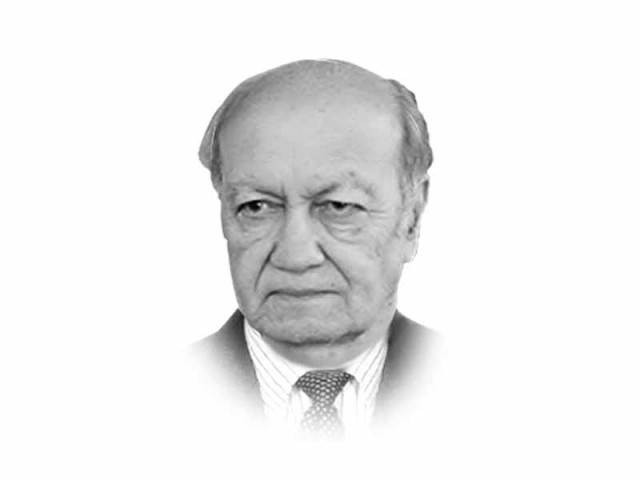Need for revisiting Afghan policy
There are indications President Ghani will be visiting Pakistan soon. This could set the stage for revival of talks

The writer is a retired lieutenant general of the Pakistan Army and a former federal secretary. He has also served as chairman of the Pakistan Ordnance Factories Board
As a result of the recent visit of the army chief to the US and the earlier one of Prime Minister Nawaz Sharif, there are indications that President Ghani would be visiting Pakistan soon. This could set the stage for the revival of talks between the Taliban and the Afghan government, provided President Ghani is willing to repose confidence in the Pakistan military playing its role in the process.
The more central question is whether the positions of the Taliban and the Afghan government are reconcilable. As of now, there is a wide gap in their goals and objectives. Moreover, within the Taliban there are two factions and the splinter group refuses to accept the leadership of Mullah Mansoor so any decisions taken by him, in all likelihood, will be opposed. Adding to the complexity is that the Taliban is not a cohesive entity and wide differences are discernable between the aspirations and expectations of the younger lot and that of the more seasoned and battle-hardened cadres. The Afghan government itself is a victim of paralysis due to internal power struggles between President Ghani and Abdullah Abdullah. In this political scenario, a breakthrough will take considerable time and patience. Pakistan, primarily, will remain a scapegoat and blamed for any failures.
It is, however, encouraging that despite these prevailing tensions and contradictions, the Afghan and Pakistan governments have remained engaged in talks discreetly. Geographic compulsions and mutual dependence leave no other option, but for the two countries to to keep channels of communication open.
Fortunately, well-meaning leaders on both sides want peace but differ on how to proceed on this front. Mutual economic and commercial interests remain an important incentive to develop a broad and cooperative relationship. Most of Pakistan’s major current and future projects are linked to Afghanistan. Clearly, it is a win-win situation if relations were to normalise. But the key is to restore confidence in Afghanistan of Pakistan’s sincerity in promoting peace that is all-inclusive. Pakistan is viewed with suspicion and distrust for failing to act in a tough manner against the Taliban and giving it political and geographic space, as the group continues the insurgency. Within Pakistan, there are doubts regarding whether President Ghani is fully in charge or not. The onset of winter provides a window of opportunity as the fighting will stop. No one expects the Taliban to surrender arms at this stage, but surely it could be persuaded to engage in serious peace negotiations. At the same time, the international community expects Pakistan to deny sanctuaries to the group and restrict movement of those of its members who are living here, weakening their ability to wage the insurgency so that they are more amenable to a negotiated settlement.
If the Afghan army fails to prevent the Taliban from expanding its territorial gains, the latter’s dependence on Pakistan will reduce and hence the military’s influence over them will also diminish. The military has been hesitant in taking a harsh attitude towards the Haqqani network and the Taliban. Supposedly, the premise is that if the Afghan government further weakens and loses control, then these groups could align themselves with the TTP and turn against Pakistan. This is a circular logic, because apart from antagonising the Afghans and supporting the Haqqanis, the Taliban goes against Pakistan’s own interests. Once the Taliban becomes a dominant force in Afghanistan, it will be a source of strength and inspiration for the TTP.
We need to remind ourselves that all regional and global powers, including China, are opposed to the Taliban. China’s main interest in stabilising Afghanistan is to prevent a spillover effect of the insurgency in its province of Xinjiang and on the CPEC as it wouldn’t want its economic interests to be compromised.
President Obama’s announcement that American forces will remain in Afghanistan at their current level throughout 2016 and if need be, for another year or more, are factors that could bring the Taliban to the negotiating table. The rising influence of the Islamic State in the region should also contribute in persuading the Taliban to talk to the Afghan government.
Linked to this scenario are also larger issues that need to be resolved internally in Pakistan for a more durable relationship with Afghanistan. The warped civil-military balance has contributed in Pakistan looking at Afghanistan and the region primarily through the security lens. It is not for Afghanistan as much for our own future that we should focus on a state-to-state relationship rather than cling to old policies focusing on the use of non-state actors. Foreign and defence policies cannot be pursued in isolation and with a linear focus on security. In a world where geo-economics is taking precedence, Pakistan and Afghanistan have to shed the burden of history and move towards a cooperative relationship that serves their people. They should widen economic, political and cultural links and benefit from transit trade instead of remaining hostage to the past. Globalisation requires regional harmony and cooperation, not confrontation.
Published in The Express Tribune, December 2nd, 2015.
Like Opinion & Editorial on Facebook, follow @ETOpEd on Twitter to receive all updates on all our daily pieces.













COMMENTS
Comments are moderated and generally will be posted if they are on-topic and not abusive.
For more information, please see our Comments FAQ